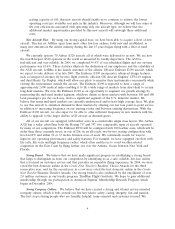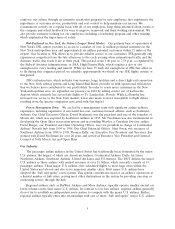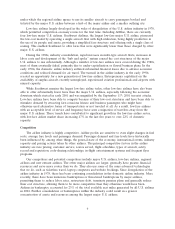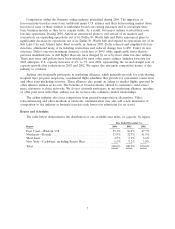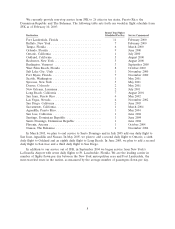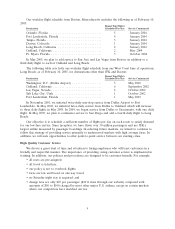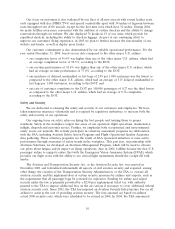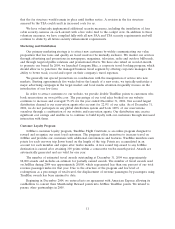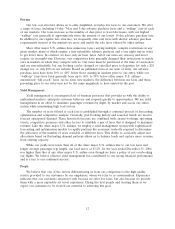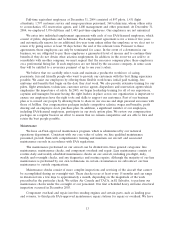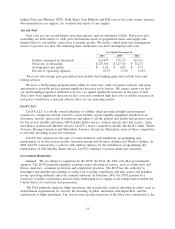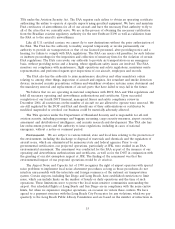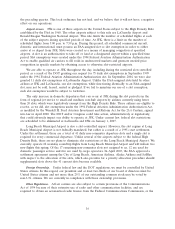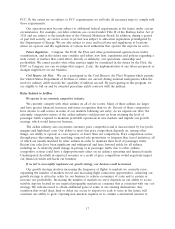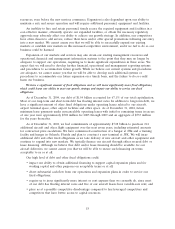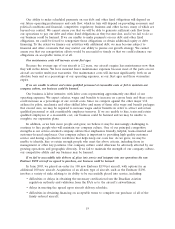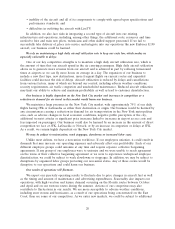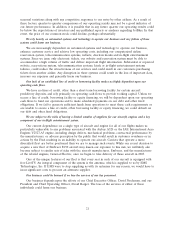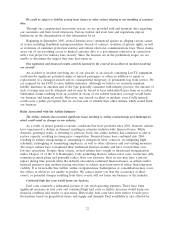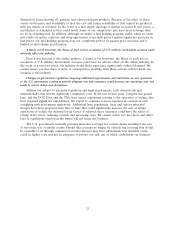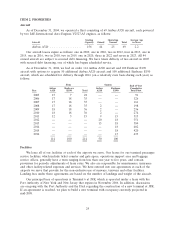JetBlue Airlines 2004 Annual Report Download - page 22
Download and view the complete annual report
Please find page 22 of the 2004 JetBlue Airlines annual report below. You can navigate through the pages in the report by either clicking on the pages listed below, or by using the keyword search tool below to find specific information within the annual report.
utilized Pratt and Whitney, MTU, Rolls Royce East Kilbride and IHI, four of the joint venture partners
who manufacture our engines, for overhaul and repair of our engines.
Aircraft Fuel
Fuel costs are our second-largest operating expense and are extremely volatile. Fuel prices and
availability are both subject to wide price fluctuations based on geopolitical issues and supply and
demand that we can neither control nor accurately predict. We utilize a third party fuel management
service to procure our fuel. The following chart summarizes our fuel consumption and costs:
Year Ended December 31,
2004 2003 2002
Gallons consumed, in thousands ......... 241,087 173,157 105,515
Total cost, in thousands ................ $255,366 $ 147,316 $ 76,271
Average price per gallon ............... $ 1.06 $ 0.85 $ 0.72
Percent of operating expenses ........... 22.1% 17.8% 14.4%
Total cost and average price per gallon each include fuel hedging gains and exclude taxes and
fueling services.
We have a fuel hedging program under which we enter into crude oil option contracts and swap
agreements to partially protect against significant increases in fuel prices. We cannot assure you that
our fuel hedging program is sufficient to protect us against significant increases in the price of fuel.
There have been significant increases in fuel costs and continued high fuel costs or further increases in
fuel prices would have a material adverse effect on our operating results.
LiveTV, LLC
LiveTV, LLC is a wholly owned subsidiary of JetBlue which provides in-flight entertainment
systems for commercial aircraft. LiveTV’s assets include certain tangible equipment installed on its
customers’ aircraft, spare parts in inventory and rights to all the patents and intellectual property used
for live in-seat satellite television, XM Satellite Radio service, wireless aircraft data link service, cabin
surveillance systems and Internet services. LiveTV’s major competitors include Rockwell Collins, Thales
Avionics, Boeing Connexion and Matsushita Avionics. Except for Matsushita, none of these competitors
is currently providing in-seat live television.
LiveTV has contracts for the sale of certain hardware and installation, programming and
maintenance of its live in-seat satellite television system with Frontier Airlines and WestJet Airlines. In
2004, LiveTV entered into a contract with AirTran Airways for the installation, programming and
maintenance of XM Satellite Radio Service. LiveTV continues to pursue additional customers.
Government Regulation
General. We are subject to regulation by the DOT, the FAA, the TSA and other governmental
agencies. The DOT primarily regulates economic issues affecting air service, such as certification and
fitness, insurance, consumer protection and competitive practices. The DOT has the authority to
investigate and institute proceedings to enforce its economic regulations and may assess civil penalties,
revoke operating authority and seek criminal sanctions. In February 2000, the DOT granted us a
certificate of public convenience and necessity authorizing us to engage in air transportation within the
United States, its territories and possessions.
The FAA primarily regulates flight operations and in particular, matters affecting air safety, such as
airworthiness requirements for aircraft, the licensing of pilots, mechanics and dispatchers, and the
certification of flight attendants. The civil aviation security functions of the FAA were transferred to the
14


